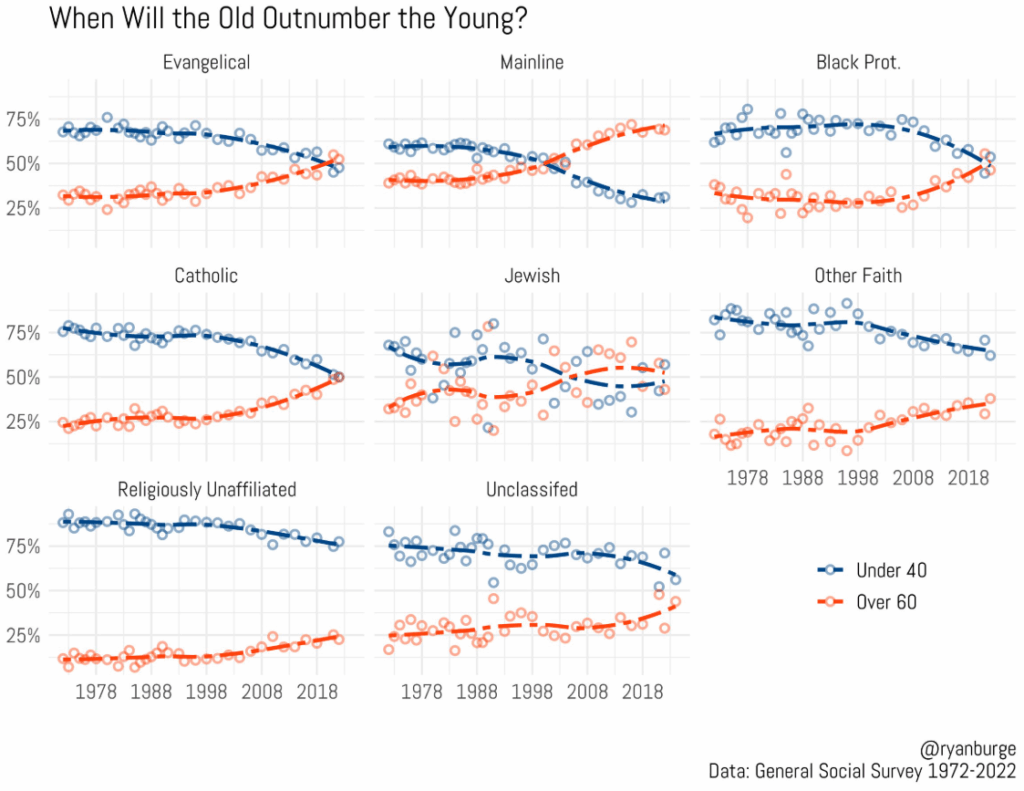Last month, we talked about evangelicals’ illusions of a massive revival going on with Gen Z, who are people between the ages of about 13-28. Even at the time, those claims seemed largely to derive from evangelicals’ fantasies. But if anything, these fantasies have only gotten more insistent within that brief time—and evangelicals have only grown more clueless about how those fantasies spread within their community.
(This post and its audio ‘cast first went live on Patreon on 10/3/2025. They’re both available now!)
SITUATION REPORT: Evangelicals keep claiming a Gen Z revival, despite all available data contradicting them
Since we last talked about a supposed “quiet revival” of Gen Z, conservative Christians have continued to blow this story up. Just over the past month or two, we’ve seen a deluge of stories promising a Gen Z revival. Here’s a selection of them:
In August 2025, Harvard Magazine covered the story of a young man raised in a liberal household—only to convert to hardline Catholicism and adopt conservative politics. A week later on September 2nd, Barna Group announced that “Young Adults Lead a Resurgence in Church Attendance.” (Evangelical sites in particular, like Word in Black, embraced that story wholeheartedly.)
Right after that on September 8th, Christianity Today assured readers in no uncertain terms:
If you are suspicious of the claims that Gen Z is experiencing a great awakening of spirituality, then you need to kill those doubts. It is happening. [. . .] Pastors and Christian leaders should reject the cynicism that can often occur when we hear of a movement of the Holy Spirit among younger generations.
Yes, everyone needs to turn off their pattern-recognition skills and just uncritically accept this amazing revival going on with Gen Z!
CNN continued the parade on September 15th with a story about an amazing revival going on in Paris—spurred mostly by Gen Z people joining Catholicism. (It may be based on this earlier story, which reminds us that when one is dealing with very small numbers and percentages, even the most modest upticks can look very dramatic.) The same day, Religion News ran a story about a new documentary called The Revival Generation: Gen Z turning to Jesus.
On September 18th, powerful megachurch pastor J.D. Greear told Crosswalk (an evangelical site): “Gen Z is going back to church. …We’re seeing it on our college campuses.” Even The Gospel Coalition picked up the story on September 24th, insisting that “something drastic is shifting in the spiritual atmosphere of the Western world.”
These stories are just the current tip of the iceberg. I’d been noticing them already since we last discussed the “Quiet Revival.” But then, my desire to revisit the topic solidified when I spotted this story on Relevant on September 25th: “Jennie Allen: ‘This Generation Just Wants God’.”
Oh, do they now, I thought to myself. Do they really?
Gen Z’s future impact on Christianity can sometimes be a complicated picture—thanks to Christians
Almost all of the sources cited earlier are Christian. Most are evangelical. Unsurprisingly, Christians generally don’t like the idea of their religion being in decline in the Western world. Evangelicals like it even less. (Meanwhile, Catholic leaders seem as weirded out and displeased as I am about the influx of evangelicals into the tradcath, short for traditionalist Catholic, faith.) So they celebrate literally any upticks anywhere as a massive revival.
They’ve always been happy to run with fake news if it benefits them. That’s why they went nuts over a pseudo-revival in Asbury, Kentucky in 2023. (Tangential: One of the people at that prayer meeting had measles, which exposed hundreds of other students to the disease. Also, I’m 99% sure the school helped make the pseudo-revival into an official thing. Once school administrators moved the prayer meeting off-campus, it completely fizzled out.)
As Ryan Burge tweeted in June 2025, anyone who thinks there’s some massive Gen Z revival must find some explanation for the actual data about these young Americans. That data hasn’t changed at all. PRRI (Public Religion Research Institute) studies still point to a slow but steady decline in the percentage of believers and the unaffiliated.
That decline will likely only accelerate in a few years as older Christians continue to pass away. According to Burge, people 60+ years of age now outnumber those aged 18-40 in evangelicalism, Black Protestantism, and Catholicism. That’s a demographic time bomb if anything ever was. This fact may be why the National Council of Churches predicted in 2024 that 100k churches will close in America “over the next several years.”

Moreover, no serious researchers seriously expect these numbers to improve (for Christians at least). Whatever Gen Z is doing, it isn’t moving the needle on Christian decline. In a decade or so, they’ll be taking their own kids to coffeeshops built from the aged, abandoned, sold-off church buildings that their grandparents once attended.
What might be happening instead with Gen Z
As a July 2025 story in The Hill put it: “The more significant religion story is that young women and young men are moving apart religiously.” For about a year now, various media sites (like New York Times) have noticed that Gen Z men and women increasingly inhabit two completely different religious and political worlds. As Gen Z men become, on average, more conservative and misogynistic, Gen Z women become more liberal and feminist.
For some Gen Z men, becoming a hardline evangelical or a tradcath is simply part of taking on an overall extremely-conservative political identity. Some Christians themselves are wrestling with this exact thought. In The Story Church Project, one Christian suggests that young men are aching for a feeling of purpose—and adopting a sexist identity as a reaction to feminism.
As these young men get older, many of them will likely shed the religious window-dressing around that identity—just as young adults in every recent generation have after a period of youthful religious zeal.
In time, I think we’ll also find that the COVID-19 pandemic had a hand in driving young men rightward. It’s still a bit early to say that, but I’m not the only one thinking it. The Harvard Magazine story (relink) opens with this exact situation, and Anxious Bench at Patheos also suspects it.
Money makes the Christian world go around
A September Barna article brings everything into stunning focus. It begins: “New research from Barna Group, as part of their ongoing State of the Church initiative with Gloo, reveals a surprising shift. . .”
As soon as I saw the name “Gloo,” I knew this was about saving a failing business.
Gloo is a slick marketing company that has been intensely involved with evangelism for years now. They’re the company behind that idiotic “He Gets Us” ad campaign that’s cost high-rolling evangelical donors hundreds of millions of dollars so far. Their specialty involves hoovering up customer and site-visitor data, packaging it, and selling it to churches. I’m not surprised to see that it’s Gloo blowing sunshine up Barna’s skirt now.
Barna is a for-profit, evangelical-led survey house. They specialize in selling church-growth and evangelism materials to panicky pastors. They sell hope in a box. No wonder they’re painting such an optimistic picture now.
Basically, I’m willing to lay actual money on Gloo and Barna being involved in many of the story links I’ve shown today.
After all, if you knew a business was doing poorly, would you invest every penny you have into it? Or would you find one that’s doing well? Christianity is a business, at heart. Its managers (pastors) want to make enough money to keep the clubhouse (church) solvent and draw a paycheck from their repeat customers (pew-warming, tithes-paying congregants).
Ordinarily, those business managers might achieve at least a little stability through keeping their customer base at its current levels. But the percentage of customers donating to the business keeps shrinking. Worse, so does the amount of money donated per customer. Evangelicals never had much slack with donations, either, since very few congregants tithe in the first place. Even those few tithers rarely donate anywhere close to 10% of their income. As an October 2024 Lifeway Research report shows, any drop in giving dramatically affects church budgets.
Thus, just to maintain the same income, the business must consistently grow its customer base.
Listen to them shouting ALL IS WELL!

By remarkable coincidence, that’s what church leaders want the public to believe with all these puff stories about a Gen Z revival: ALL IS WELL! The business is growing again! GET BACK IN HERE!
At all costs, potential donors must never get the idea that their donations are just being thrown down a black hole. (In addition to that one September story about a Gen Z revival (relink), Christianity Today also ran a column about how incredibly important it is to subscribe to Christianity Today. Who’s surprised?)
The available reputable data doesn’t lead me to any big revivals, however—among Gen Z or anyone else. Nothing I’ve seen so far suggests there’s any big turnaround in Christianity’s decline—only a temporary plateau. Even that plateau exists only in service to an overall morphing of tradcathery and evangelicalism into an extremely conservative political identity for young men.
If the data said something else, I’d roll with that. In my own life at least, I must build my beliefs and action plans on whatever the facts are. For now, the facts remain plain. Christianity won’t be achieving a triumphant return to dominance in the West, at least not as things stand now.
NEXT UP: The dark side of divine guidance. And oh, it is dark indeed. See you soon!
Please support my work!
Thanks for reading, and thanks for being part of our community! Here are some ways you can support my work:
Endnotes.
Also: Confidential to Barmy in Barna: Stop trusting Gloo—unless you want to be known as suckers for anyone with an ear-tickling story.



2 Comments
The amazing evangelical cope about their ongoing decline - Roll to Disbelieve · 11/10/2025 at 4:00 AM
[…] (Bonus topic crossover: He also believes the false narrative of the so-called “Quiet Revival,” which we discussed recently!) […]
A look back at evangelical prophecies for 2025 - Roll to Disbelieve · 01/16/2026 at 4:00 AM
[…] Generation Rising,” meaning Gen Z will convert/rededicate like crazy. This is likely part of evangelicals’ imaginary “Silent Revival,” which didn’t move the needle at all on young adults’ move away from […]